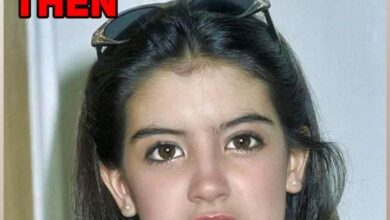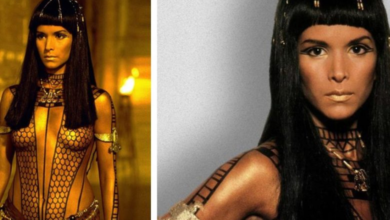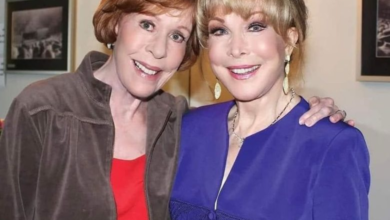Stranger Saves My 91-Year-Old Mom in a Blizzard After Her Family Left Her Behind

It was the kind of night small towns talk about for years afterward—a Michigan snowstorm so fierce it seemed to erase the world. And in the middle of it, a man named Derek lifted my 91-year-old mother into his arms and carried her through the storm, saving her life when her own sons hadn’t.
My mother, Ruth, is small—barely ninety pounds, four-foot-ten, and living with dementia. Some days she’s sharp and smiling; others, she fades into confusion. She has two sons: me, Michael, down in Florida, and my brother Tom, just twenty minutes away from her assisted-living home in northern Michigan.
Eight years ago, I moved south. I told people it was for work, for the warmth—but really, it was escape. I was worn out. The hospital visits, the late-night calls, the endless cycle of worry—it all became too much. I convinced myself professional caregivers could do better. It was the lie I told so I could breathe.
On January 17, the facility called Tom. Mom had fallen and needed X-rays. He said he was stuck in meetings. When he heard the $800 ambulance fee, he refused. Then he called me to complain. I told him to handle it and hung up.
They arranged a cheaper transport van to take her to urgent care—just three miles away. The driver dropped her off and left, assuming someone would meet her.
No one did.
She waited six hours—cold, confused, wearing slippers and a thin sweater—believing her sons were on their way. When the clinic closed at 7 p.m., staff tried calling Tom. No answer. They called me. I saw the Michigan number flash on my phone and ignored it.
That’s when Derek appeared.
A biker, snow clinging to his jacket, had stopped to check the weather. He saw my mother sitting alone, quietly crying. “My boy’s coming,” she told him. “Tommy promised.”
The receptionist, near tears, explained that Ruth had been left and couldn’t stay overnight. Outside, the temperature had dropped to 19°F, the wind cutting like glass.
Derek asked for our numbers. He called Tom four times, me twice. Silence.
So he made a choice.
He took off his leather jacket, wrapped it around her, and said, “Let’s get you home.”
Then he lifted her—this tiny, trembling woman—and stepped into the storm.
The snow reached his knees; the wind howled. But he kept walking. He talked to her the whole way—about his kids, his motorcycle, his job—to keep her calm. She talked about her husband, her “good boys.” Derek didn’t correct her. He just walked.
Halfway there, a police car spotted them. The officer helped them inside and drove the rest of the way.
At the facility, staff were stunned. Derek was soaked through, beard iced over, hands shaking. “You carried her?” someone asked. He nodded. “Couldn’t leave her there.”
They warmed her up. A report was filed. The director called me around 9 p.m. I almost ignored the call again—but this time, I answered.
Her voice broke as she told me what had happened: the fall, the hours waiting, the biker who’d carried my mother through a blizzard when her sons wouldn’t.
I threw up. Then I called Tom and screamed. He screamed back. Neither of us was wrong.
The next morning, I was on a plane. Mom was alive—bruised, frostbitten, but alive. I asked for Derek’s number.
He picked up on the second ring. I tried to thank him, but he cut me off.
“You should be ashamed,” he said. “This woman carried you for nine months. You couldn’t answer a phone. Do better.” Then he hung up.
The following day, I drove to his home with flowers, a thank-you card, and a $5,000 check. He refused it. “Spend it on your mom,” he said.
His wife came to the door—kind, but firm. “He nearly froze carrying her,” she said. “Couldn’t move the next day. But he’d do it again. Because that’s who he is. He doesn’t leave people behind.”
The shame hit harder than the cold ever could.
Within a week, I brought Mom to Florida. Paid the $80,000 transfer penalty without hesitation. Worth every cent. I see her every day now. Tom and I don’t talk. When people ask if I have a brother, I say yes—his name is Derek.
He stops by when he’s passing through. Mom’s face lights up when she sees him, though she doesn’t remember why. “You remind me of my husband,” she tells him. He smiles. “That’s the nicest thing anyone’s ever said to me.”
Once, I asked him why he did it—why risk himself for a stranger.
He shrugged. “Because she needed help. Because she mattered. Because I couldn’t live with myself if I walked away.”
I still carry guilt for my failure. But I’m learning.
Now, I take Mom out to lunch three times a week. We watch her favorite shows. I hold her hand when she’s scared. I answer every call. She never waits alone again.
Derek showed me what real decency looks like. A leather-clad biker—the kind of man I might have judged—did what her own family wouldn’t. He walked through a storm for a stranger.
My mother didn’t deserve that night, but she deserved the man who showed up.
So, Derek, if you ever read this—thank you. You didn’t just carry my mother through a blizzard. You carried me out of my own neglect.
You proved that character isn’t about appearance—it’s about action.
And for that, you’ll always be my brother.



